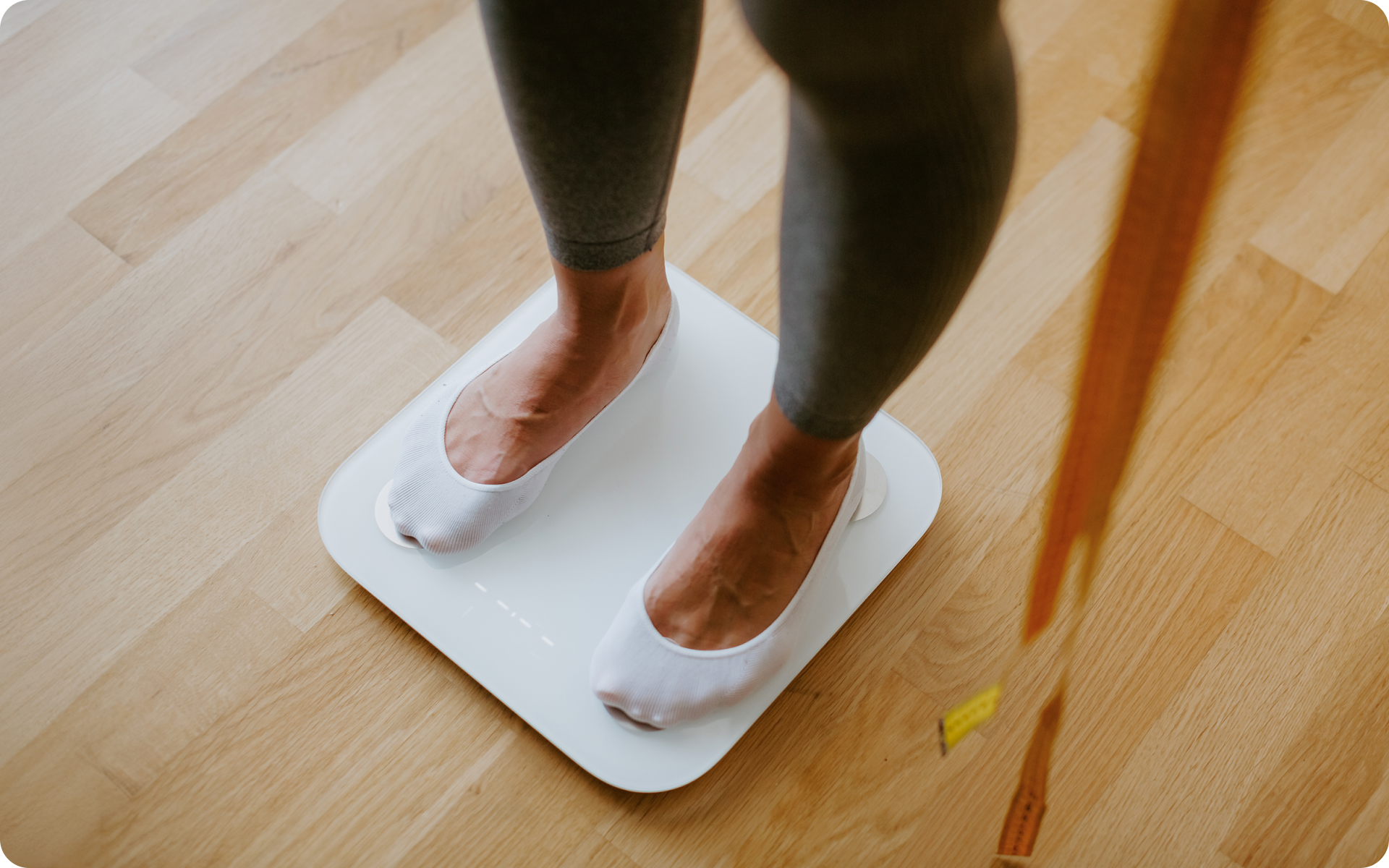If you’ve ever stepped on the scale after a workout, there’s a good chance that you found your weight had gone up. This is probably one of the most frustrating parts about working out. But before we get into why this happens and what to do about it, let’s first understand how our bodies work when we exercise in order to better understand how our weight fluctuates throughout the day.
What Happens in Your Body When You Workout?
Your body is like a furnace, burning calories to produce the energy that is needed for your daily functions. Your heart pumps blood throughout your body to provide you with this fuel, your respiratory system adjusts your oxygen intake, and your nervous system controls muscle contractions. When you work out, these systems are pushed into high gear, which means more energy is required by your body.
The amount of energy that’s needed during a workout hinges on several factors (2):
- The duration of the workout
- The type of exercise
- Your age, weight, and sex
Just as when you’re resting, there’s no way to control how much energy is used throughout your workout. However, you can adjust the length of time that you exercise, which will ultimately impact how many calories are burned.
When a workout is over, it may seem as if you haven’t burned any fat at all because your weight hasn’t dropped by a significant amount. But actually, what’s going on inside your body during this period is much more important than the number on the scale. There are several different factors that contribute to weight gain after a tough workout session:
We’ve compiled a great workout routine in our 4-Day Lifting Routine blog.
Are You Gaining Weight Working Out?
It’s possible for your scale to move upwards after working out. You should know that this increase is not attributable to fat. Here are some reasons for post-workout weight gain:
Dehydration
If you’re dehydrated, your body will retain water (4). Therefore, when you start drinking fluids again after your workout, it’s common to see an increase in weight. Not only does it weigh more than before, but the hydration may not make your clothes fit too. You can remedy dehydration by drinking plenty of fluids throughout the day both before and after a workout.
Muscle Healing
When muscles heal from strenuous exercise, they need extra fluid for repair and healing purposes. During this period of time, its cells swell with water, which causes increased weight on your scale (3).
BetterMe is your fast-track ticket to a long-lasting weight loss! Tailor your fitness journey and maximize your results with just a couple of swipes!
Increase In Appetite
Another reason some people gain weight is because their appetite increases after a tough workout. It makes sense that your body would be hungry after burning all of that energy. Without self-control, it can be easy to get carried away with eating, which means you may end up consuming more calories than usual, and this can ultimately affect your weight.
Supplement Use
Even though supplements such as protein powders, energy bars, and vitamin pills aren’t an integral part of the body’s natural function, they are just as important for regular workouts. They can be used to reduce fatigue, improve performance, or increase muscle growth (10). The problem with some supplements is that you just don’t know what all of their ingredients are.
If you consume something that contains caffeine for example, your weight will drop before becoming elevated for a short time, as caffeine is a diuretic that causes increased urination, leaving your system dehydrated (1).
Undigested Fiber-Rich Food
It’s possible to see an increase on the scale if you eat large quantities of high-fiber foods after a workout. There are many benefits to fiber, but it can be pretty rough on the digestive system. Fiber is undigested until it reaches the large intestine where it gets fermented, which causes increased gas production (5).
Why You Shouldn’t Worry About Post-Workout Weight Gain
After all of this, you may think that increased weight is a bad thing. However, your body needs time to adjust after a workout. Your muscles may be sore for a day or two as they heal from the exercise and that is completely normal.
As long as you’re maintaining good health through proper nutrition and regular exercise habits, there’s no reason to worry about a temporary increase in weight after a workout routine because it will even out soon enough.
We’ve compiled a list of foods to take out of your diet in our Foods To Avoid To Lose Belly Fat blog.
How to Make Sure You’re Getting Accurate Readings from Your Scale
If you’re concerned about weight fluctuation, it may help to make sure you’re always getting accurate readings. Here are some tips that could help:
Weigh Yourself Only Once a Week
If you’re still concerned about your weight, try monitoring it only once a week. It’s normal to fluctuate anywhere between 1-2 pounds every day and even more than that on some days, but this doesn’t mean anything is wrong. There are many changes that can affect your weight in such little time, such as fluid retention or muscle growth during the week (9). If you weigh yourself every day after working out, don’t expect linear results because that is uncommon.
Weigh Yourself in the Morning
Make sure you always weigh yourself at the same time of day, ideally in the morning after you’ve been to the bathroom. Your weight gradually increases throughout the day as your hormones change and you eat and drink. You should always try to weigh yourself first thing in the morning before you eat or drink anything (9).
Read more: Thigh Workout Guide: 7 Effective Exercises for Building Leg Strength
Use the Same Scale Every Day
It’s important to always use the same scale so you can compare apples to apples. Different scales will give different readings and if you’re not consistent, your weight comparisons won’t be helpful. Make sure it’s calibrated for accurate results too, as even small variations in weight can make a big difference over time. Be sure to set your scale on a hard surface such as a tiled floor or concrete. Setting your scale on carpet can give inaccurate results.
Use Other Metrics to Track Progress
If you want to know if your workout routine is paying off, use other metrics to track your progress. For example, you could measure the circumference of your arms or waist every week. This will help you see if your muscles are getting bigger over time, which may not be reflected on the scale accurately because of all the factors that can influence it.
Make Sure the Scale Is Well Calibrated
Another way to make sure your results are accurate is to check the calibration of your scale. The last thing you want is for a scale to give you inaccurate readings simply because it isn’t calibrated well. Make sure your digital scales are labeled as being “calibrated” or have an indicator that tells you when they need to be checked by the manufacturer. Electronic scales also have a power adapter that can be used to recalibrate them if required.
Ditch the Scale
Weighing yourself too often can quickly become a source of anxiety. It’s really not a good idea to step on the scale every day because you’ll constantly worry about your weight. If you find yourself fixated on numbers, it may be time to ditch the scale and use other metrics to track your progress.
If you’ve mustered up the courage to crush your weight loss goal, let Betterme take the sting out of this demanding process. Our app will help you restructure your habits, remold your life and crank up your fitness results!
FAQs
Should you weigh yourself after working out?
You shouldn’t weigh yourself immediately after working out because you won’t get the most accurate weight measurement. During exercise, a number of factors can contribute to weight fluctuations, including water retention and muscle fatigue. These temporary changes in weight can give you a misleading result if you weigh yourself immediately after your workout (7).
Water Retention
One factor that can contribute to weight gain after working out is water retention. After exercise, the muscles take on additional water and nutrients to heal. This can cause a temporary increase in weight. In addition, if you’ve consumed a significant amount of water or fluids before your workout, this can contribute to a higher number on the scale. It’s important to stay hydrated during exercise, so don’t avoid drinking water for fear of gaining weight. Instead, wait until after your body has had time to recover and adjust its fluid levels before you weigh yourself (7).
Muscle Fatigue
Another factor that can affect weight when weighing yourself after working out is muscle fatigue. During exercise, your muscles are being used and may become fatigued, which leads to water uptake and temporary swelling or inflammation. This can also contribute to a higher number on the scale (6).
It’s important to note that this type of weight gain is not necessarily a bad thing. It means that your muscles have been working hard and are in the process of repairing and building new muscle tissue. This can lead to long-term weight loss and improved overall health (8).
So, when is the best time to weigh yourself? The most accurate results will come from weighing yourself first thing in the morning, after you’ve used the bathroom and before you eat or drink anything. This will give you the most consistent and reliable measurement of your weight (7).
It is also important to remember that the number on the scale is not the only indicator of progress. Other factors such as body composition, measurements, and how you look and feel can also be used to track progress toward your fitness goals.
How much does your weight increase after a workout?
The amount of weight you may see on the scale after a workout can vary depending on the individual and their specific circumstances. Some people may experience an increase in weight due to water retention and muscle fatigue, while others may not see any significant change at all.
Generally, it’s quite normal to see a temporary increase in weight after a workout, ranging from 1-2 pounds. This is typically due to water retention and muscle inflammation, as previously mentioned.
It’s important not to get discouraged by this temporary increase in weight. It doesn’t necessarily mean that you’ve gained fat or are moving away from your fitness goals. Instead, you should focus on long-term progress and remember that weight fluctuations are a normal part of the body’s natural processes.
Our Burn 500 Calories a Day article has detailed instructions on how to induce a calorie deficit efficiently.
How long does temporary weight gain after exercise last?
Temporary weight gain after exercise can last anywhere from a few hours to a couple of days. This is dependent on individual factors such as hydration levels, intensity and duration of the workout, and overall body composition.
In most cases, the temporary increase in weight should return to normal within 24-48 hours. However, if you experience prolonged weight gain or notice other changes in your body, it may be worth reviewing your exercise routine and consulting a healthcare professional.
Is it normal to gain weight before you lose it?
Yes, it’s normal to experience temporary weight gain before you see long-term weight loss results. When you start a new exercise routine, your body may go through a phase of adjustment and adaptation. This phase can include increased muscle inflammation and water retention. However, with consistent exercise and healthy eating habits, this temporary weight gain will eventually give way to long-term weight loss results.
The Bottom Line
Weighing yourself after working out doesn’t always give an accurate picture of what’s really going on with your weight, so make sure you avoid making decisions based on those results alone.
DISCLAIMER:
This article is intended for general informational purposes only and does not serve to address individual circumstances. It is not a substitute for professional advice or help and should not be relied on for making any kind of decision-making. Any action taken as a direct or indirect result of the information in this article is entirely at your own risk and is your sole responsibility.
BetterMe, its content staff, and its medical advisors accept no responsibility for inaccuracies, errors, misstatements, inconsistencies, or omissions and specifically disclaim any liability, loss or risk, personal, professional or otherwise, which may be incurred as a consequence, directly or indirectly, of the use and/or application of any content.
You should always seek the advice of your physician or other qualified health provider with any questions you may have regarding a medical condition or your specific situation. Never disregard professional medical advice or delay seeking it because of BetterMe content. If you suspect or think you may have a medical emergency, call your doctor.
SOURCES:
- Caffeine ingestion and fluid balance: a review (2003, pubmed.gov)
- How To Determine Calorie Burn (2017, mdanderson.org)
- I Just Started Exercising – Why Am I Gaining Weight (2020, clevelandclinic.org)
- Intracellular Edema and Dehydration: Effect of Energy Metabolism in Alveolar Macrophages (1976, science.org)
- Increasing fiber in your diet may increase gas (2022,uclahealth.org)
- Muscular fatigue and its effects on weight perception (1999,sciencedirect.com)
- The Best Time To Weigh Yourself (and How Often You Should Step on the Scale) (2023,cleveland.org)
- The underappreciated role of muscle in health and disease (2006,sciencedirect.com)
- What to Know About Weighing Yourself (2021, webmd.com)
- Will supplements help your workout or diet routine? (2018, nih.gov)









